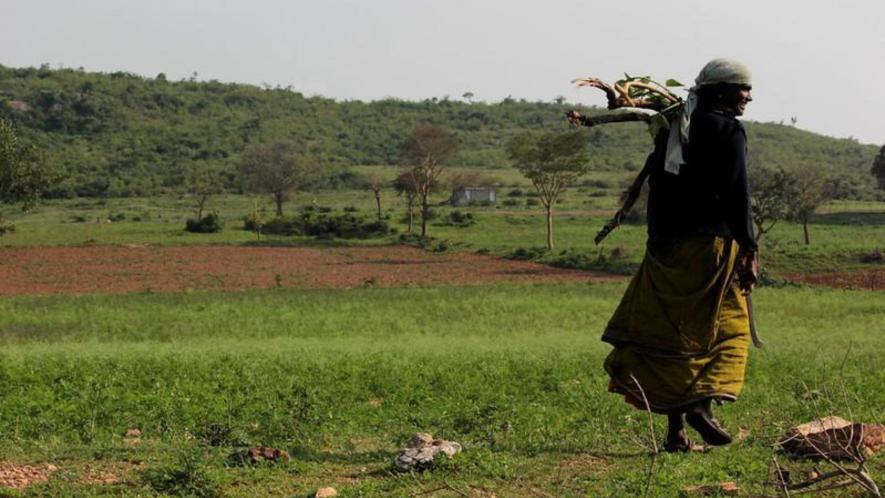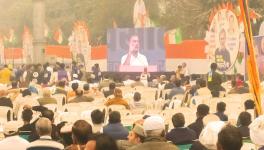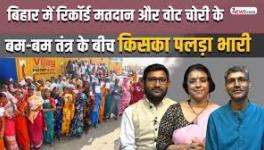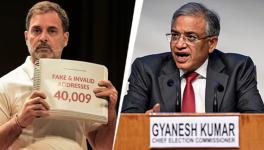Tribal Voters Split in Madhya Pradesh Amid Growing Anger

Representational Image. Image Courtesy: Flickr
There are 47 seats reserved for the Scheduled Tribes in the Madhya Pradesh Assembly, and the 21% tribal population can influence another 40 seats. Scheduled Castes make up about 16% of the Madhya Pradesh population. Of the state’s 230 Assembly seats, 35 are reserved for the Scheduled Castes.
Political analysts assert that any party that has the Scheduled Caste, Scheduled Tribe and Muslim voters on its side cannot be defeated at the hustings. But as Madhya Pradesh goes to the polls on Friday, the tribal pitch is not clearly in favour of either of the large national parties, of which the Bharatiya Janata Party (BJP) has had a long stint in power in Madhya Pradesh. One reason is the tribal communities’ search for their own political representation, and a rising tide of assertion among the tribals and Dalits alike.
The party supporting the Gond tribals, the Gondwana Gantantra Party (GGP), whose traditional vote bank is in the Mahakaushal region, has tied up with the Bahujan Samaj Party (BSP), which has a support base in the Bundelkhand and the Gwalior-Chambal belt.
Keeping their sights on these 37% combined votes, the BSP-GGP combine wants to capture the space of a third front in the upcoming state polls.
At every election meeting, the state president of the GGP, Amaan Purti, is high on rhetoric while highlighting the basic demands of the tribals.
“We want our Jal, Jungle, Zameen returned to us. We also demand that 25% royalty from mining in our forests be given to [local] tribals. If Congress and Bharatiya Janata Party [BJP] governments had wanted to improve our lot, they would have ensured basic amenities such as education, proper health services and uninterrupted electricity where tribals live,” he roars, describing the Congress as “slow poison” and the BJP as “cunning snakes”.
The GGP has fielded 52 candidates, while the BSP is contesting from 178 constituencies.
The GGP was formed in 1991 and has been championing the demand for a separate Gondwana state. The problem is a great deal of factionalism exists among the tribes, namely the Bhil, Gond, Kol, Kurku, Sahariya, and Baiga, who refuse to lend support to the GGP, seen as a pro-Gond party.
The result is that despite the GGP having fielded many candidates since its inception, it has failed to win a single seat in any Assembly election. In the last election in 2018, the party tied up with the Samajwadi Party, which won one seat. In the same election, the BSP won only two seats.
Purti’s roadside meetings are well received despite this. The same can be said about Fagram, who belongs to the Bhumkapura village in the Hoshangabad district and is a candidate of the Samajwadi Jan Parishad (SJP) party. He has taken up two key issues. Says Fagram, “I want land pattas given to all non-tribals who have been farming for generations in forest lands. The government has no right to displace them.”
He also wants fishing rights for tribals working under the banner of the Tawa Fishing Cooperative Society. “The state government under Motilal Vora had given the tribals displaced due to dam construction the right to fish in the Tawa Dam. This right has been taken away, and we demand it is returned,” he says.
Yet another tribal party has appeared on the political horizon of Madhya Pradesh. Called the Jai Yuva Adivasi Shakti (JAYS), its president, Dr Hiralal Alawa, has been reaching out to the tribal youth, urging them to work towards increasing their political representation in the Assembly instead of being a vote bank for parties.
Dr Alawa has struck a chord with the youth, and his enthusiastic supporters are sure to dent the fortunes of the Congress and the BJP in this election.
JAYS started in western Madhya Pradesh and has now spread throughout the state. According to political analyst Anurag Modi of the Samajwadi Jan Parishad, initially, it was considered close to the Congress. “Now that it is trying to consolidate and create its vote bank, it will cut into the votes of the bigger parties and affect their winning margins. This is why the general perception here is that no candidate will win with a large margin in tribal areas,” says Modi.
Over the last two decades, the Congress and BJP have worked overtime to woo the tribal voters. In 2003, the tribal voters were crucial in ensuring the BJP was swept to power. It won 37 out of the state’s 41 reserved seats. The tide turned in the last Assembly election when the Congress won 31 tribal seats and the BJP 16.
The Congress appointed former union minister Kantilal Bhuria, based in Jhabua and from the Bhil tribe, to head its state election campaign committee.
Bhuria has ensured his son Vikrant gets a ticket from the Jhabua seat reserved for Scheduled Tribe candidates. Vikrant is contesting against BJP-appointed lawyer Bhanu Bhuria for the seat.
Both parties are contending with massive discontent. Congress tribal leader Xavier Meda, who won this seat in 2008 but lost it in 2013, is contesting against Vikrant Bhuria as an independent candidate. The BJP’s Bhanu Bhuria is also grappling with rebellion as the party’s general secretary, Som Singh Solanki, deprived of a ticket, is standing against him as an independent.
Both official candidates know that these independents have a solid local base and can damage their prospects of victory.
To overcome the dissension, the Congress has turned to the two Gandhi siblings, Priyanka Gandhi and Rahul, to turn the tide.
The Congress party’s star campaigner waited until the Model Code of Conduct kicked in to make three pro-tribal announcements. The delay was deliberate--aimed to prevent the Chief Minister, Shivraj Singh Chouhan, from stealing their thunder, as he has been, and implementing what the Congress promises. According to the grand old party, the BJP did precisely that with the popular new Ladli Behna Yojana.
The three announcements are the implementation of the Sixth Schedule in districts with over 50% tribal population, implementation of the Panchayats (Extension to Scheduled Areas) Act, 1996 and a hike in the rate of tendu leaves from Rs 3,000 to Rs 4,000 per bag, which could benefit 45 lakh tribals.
Implementing the Sixth Schedule will allow tribals rights over water, forests, and land. They can also decide who to give mining and sand leases to, if at all.
The Congress is trying hard to capitalise on the anger among the tribals for the state government’s failure to protect their dignity and stop the rising violence against the community.
The most horrendous case came to light in July when a video showing a man, with alleged links with the BJP, urinating on a tribal. It caused a furore not only amongst members of the tribal community but across the country.
Chouhan tried to control the damage by inviting the victim to his house, where he washed his feet. The man was given financial aid, too, but tribals are in no mood to forgive the BJP, given the rise in violent crimes against Scheduled Tribes.
Madhya Pradesh registers over 25% of the nationwide crimes against tribals, the highest amongst all the states.
Some of these crimes border on the barbarous. Around a year ago, elite caste member Surendra Chauhan and his companions killed five members of an Adivasi family. The victims were strangled, stripped and then buried ten feet deep in a pit. Their bodies were discovered 45 days after the murders.
There are reported instances of tribals being beaten to death over allegations of cow slaughter, and the most horrendous of these was in August 2021, when Kanhaiya Lal Bheel was beaten, tied, and dragged by a truck on suspicion of theft. Bheel later succumbed to his injuries in a hospital.
The BJP has been highlighting a slew of pro-poor schemes, including those aimed at the tribal population, to overcome the impact of these incidents. Meanwhile, the Congress party has also emphasised its track record in Chhattisgarh and has been revealing plans to fast-track development.
As the Congress party and the BJP fiercely compete for votes, the tribal parties are challenging their claims, presenting themselves as champions of the oppressed and marginalised.
The GGP-BSP alliance hopes to capitalise on the situation, especially in areas that have had significant agitations by the Gondis and the Scheduled Caste communities in the last few years of the BJP government.
The author is an independent candidate. The views are personal.
Get the latest reports & analysis with people's perspective on Protests, movements & deep analytical videos, discussions of the current affairs in your Telegram app. Subscribe to NewsClick's Telegram channel & get Real-Time updates on stories, as they get published on our website.
























